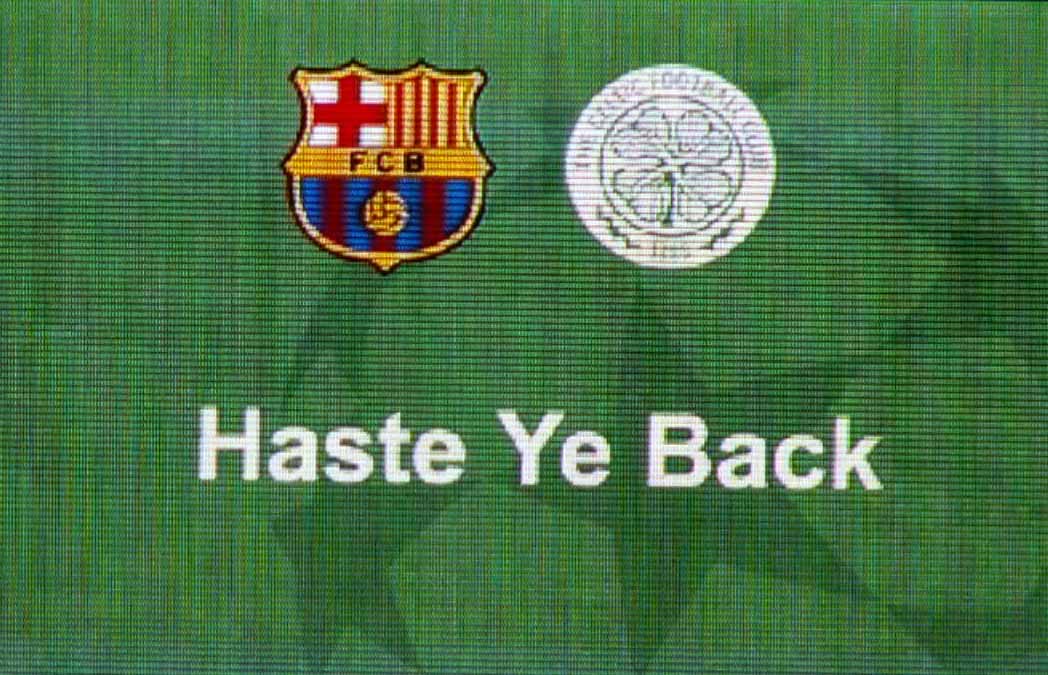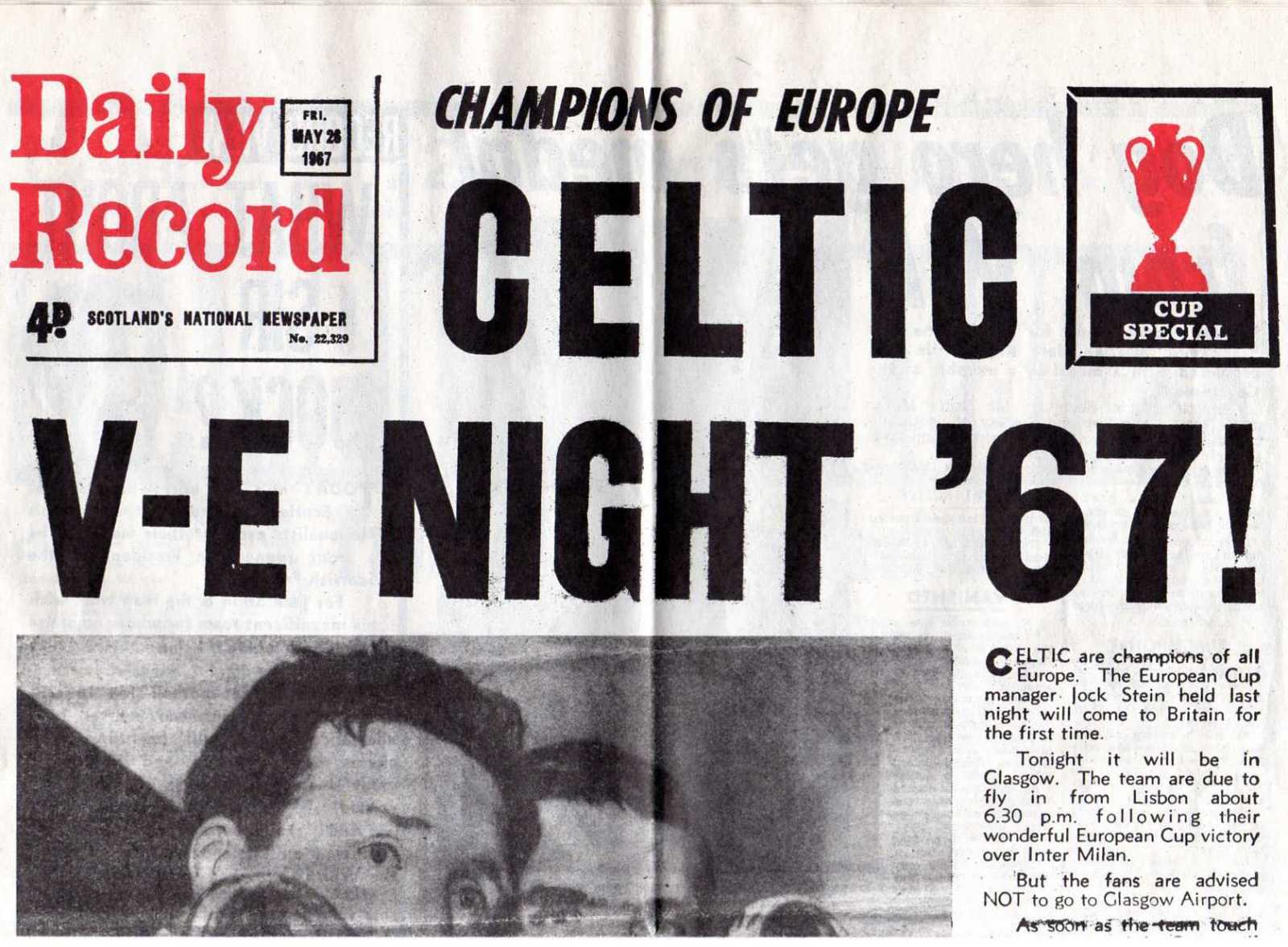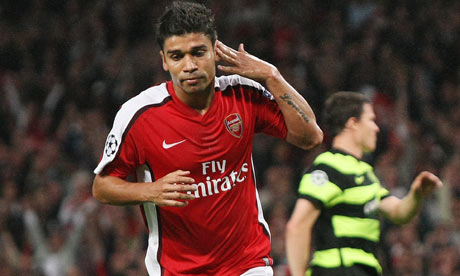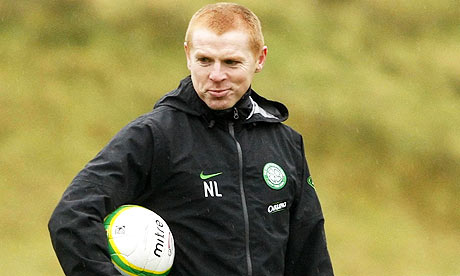I watched the second legs of the quarter finals of the Champions League this week. As it happens, I went with the default TV coverage – here that almost always means the English teams – as both ties were finely balanced. That and the fact that right now I’d watch Barcelona play 11 noddy cones if it was covered by Sky – they’re that good to watch.
Barca didn’t disappoint either. Missing their usual central defensive pairing Arsenal stood a chance at the Camp Nou, but with Arsenal also missing key men it was always going to be an enormous task. Fair play to Arsenal, they gave it their best, they took the lead and possibly could have extended it before the inevitable happened and the wonderful talent that is Lionel Messi took centre stage for the rest of the night.
Under normal circumstances, I’d have been glad to see Barcelona win anyway. But this wasn’t normal circumstances. This was the justice I’d been waiting for since late August finally arriving in Argentinian form.
As you will recall, late August is when Celtic’s involvement in Europe’s premier competition came to an all too abrupt end at the hands of Arsenal themselves. Had Arsenal just beaten Celtic we would probably have accepted that the financial gulf was a nightmare to try to bridge and we never stood a chance anyway. But they didn’t just beat us, did they? A William Gallas goal that he score by deflecting it off his back, and a Gary Caldwell own goal at Celtic Park were bitter pills to take. But those goals were nothing when compared to the ridiculous diving antics of Eduardo which destroyed even our faint chances in the second leg. When it takes the opposition until the fourth goal to actually score one of merit, you can’t help but feel it would have been nice to have had even a bit of luck. I’m sure Tony Mowbray is still thinking that about most of his Celtic managerial career though.
Nicolas Bendtner said it in his post match interview at the Camp Nou – you don’t mind losing as much if you know you’ve given your all the other team were just better than you. Well we neither gave it our all nor did those goals feel like they were down to Arsenal being better than us. Despite being second best, we still felt cheated.
So yes, I enjoyed watching Arsenal get taken apart by a far superior Barcelona team who may very well be on their way to becoming the first team to retain the European Cup in twenty years now – although I’m sure our old adversary, Jose Mourinho, will fancy a say in that particular story. Even Graham Souness was on Sky on Tuesday night declaring that this Barcelona team might be the best club side he has EVER seen. Well I’m not going to debate the beast’s wisdom here, but it raises an interesting thought.
A little over six years ago now, I – along with several thousand other Celtic fans – bounced out of the Camp Nou, singing the chorus to Willie Maley over and over again as we walked down the ramps from the very top tiers of that massive stadium. Bouncing, because we had just seen Celtic hold out for a 0-0 draw against arguably the form team in Europe at that point. A result which meant Celtic were marching on to the quarter finals of the UEFA Cup for a second successive season at the expense of the mighty Barcelona themselves. It was arguably Martin O’Neill’s finest european result among many fine results. Some have ranked it up there along side almost anything done in the glory days of the Lisbon Lions.
So how come in such a relatively short space of time there is now a huge gulf between these two great clubs? And it is a short space of time, three of the Barcelona players who started that night – Valdes, Puyol and Xavi – are still playing for Barcelona.
Sure, Celtic were probably second best in that tie against Barcelona. The second leg was undoubtedly a backs to the wall effort which made instant heroes out of the young defensive players like John Kennedy and David Marshall. But Celtic still won through, they still scored the only goal of the tie, and the first leg certainly hadn’t been as one sided. Celtic were a good match for Barcelona.
Barcelona themselves were no mugs at the time. Sure, they were in the wrong tournament as far as they were concerned, but things were on the up. Frank Rijkaard was building his team – he was still in his first full season in charge – and had them on a winning streak which would see them finish the season strong and qualify for the Champions League once more. The following season would see them face Celtic once more – with new recruit Henrik Larsson turning the Celtic Park fixture in their favour from the bench – and go on to win La Liga for the first time in 6 years. Within another 12 months they were Champions of Europe once more – and once more it was Henrik coming off the bench that swung that in their favour.
Since that Larsson inspired Champions League victory, Barcelona have dipped towards the end of the Rijkaard era before becoming one of the elite few to win the ultimate treble – the European Cup, the domestic league and the domestic cup. An elite club that Celtic started it should be noted. Barcelona went on to add the Spanish and European Super Cups to those three, and finally took their 2009 trophy haul to six with the World Club Cup. If only they’d won the Catalan Cup they could have made the same claim the Lisbon Lions make – that they won everything they played for that season. There is no doubt though that Barcelona are one of, if not, the best team in Europe right now.
Meanwhile, back at home in 2004, Celtic would go on to lose that UEFA Cup quarter final to a very decent team in Villarreal – a team who have been a thorn in the side of Barcelona in recent season incidentally – but completed a noteworthy league and cup double in Scotland. Noteworthy for the whitewash of Rangers (five games, five Celtic victories) as well as the fact that the league title was sown up without defeat (the first league defeat that season coming at home to Aberdeen following the title clinching match at Rugby Park). Again, some would argue that the 2003-04 season was the best of the five O’Neill seasons.
Many would point to the loss of Henrik Larsson to Barcelona as the turning point for Celtic. Losing such a talisman was a big blow and an impossible task to replace him awaited, but the team that O’Neill had built around Larsson was not without its problems too. Johan Mjallby also left at the end of that season, while the likes of Paul Lambert, Alan Thompson, Chris Sutton, Bobo Balde, Joos Valgaeren, and Didier Agathe would all start to fade away into the background or leave the club altogether within the next 18 months. Their replacements coming in on a cheaper budget, and the lowering of the wage bill was matched by a lowering of player standard.
The obvious answer to this problem would seem fairly simple at first glance. La Liga is one of Europe’s “big five” leagues. The big five being the countries which get the biggest slice of the Champions League TV money pie – England, Spain, Italy, Germany and France. You’ll also note they are the top five on the UEFA coefficient rankings too. These five countries are where all the money goes from this wonderful tournament. Scotland aren’t among the big five, they’re not even close. I’ve often argued that since “England” doesn’t have a TV region but “UK” does, we should be getting the same slice, but that one appears to fall on deaf ears. We are an unusual situation within UEFA to say the least.
But is it really as simple as money? It’s bound to have an effect, but is that all it is? Take a look at the Barcelona team that played Arsenal. Valdes, Xavi, Messi, Bojan, Busquets, Pedro – every single one of those players has come through the Barcelona youth system. Puyol and Pique, who were suspended on Tuesday night but would have been automatic first picks otherwise, were also products of that youth system. Iniesta and Jeffren were both on the bench on Tuesday night and they’re also a product of that youth system. In fact, it’s so ridiculous that Arsenal’s star man that they were missing in that second leg – Cesc Fabregas… yes, you guessed it, he’s a product of that youth system too! That’s a team worth of talented players all coming through Barcelona’s youth system. Not bought in, trained up from a young age and brought through.
Yes, they paid an extortionate amount of money for Ibrahimovic, but there’s still arguments over whether they were better off with Samuel Eto’o or not. Yes, there were other players out there that Barcelona had bought in. Figures like 28 million for Dani Alves and 15 million for Eric Abidal are sums of money that only Celtic could dream of seeing for players, but there is more than a substantial core of the Barcelona team and squad that they brought through themselves. That is part of the key to their success. They’re not just good players, their Barca men. They know what the club means because they’ve grown up there. You don’t get that buying in players from abroad.
Compare that with the Celtic team that played against Hibernian on Saturday. Nowhere near the prestige of a Champions League game, but Celtic had more or less their first choice eleven on the park. Darren O’Dea and Aiden McGeady are the only two of the eleven that came through Celtic’s youth system. You can take that list up to three if you count Paul McGowan on the bench. Of course, if you start looking at the bench you see the name Marc Crosas and then we’re back to talking about the Barcelona youth system – or should we just call it a conveyor belt now?!
If Celtic aren’t going to be allowed access to the kind of funds that teams of a similar size, and smaller, in terms of fan base get in the “big five”, then surely it’s time to find other ways of competing. Barcelona have so many players coming out of their youth set up that there isn’t enough spaces in their own team for them. Those that don’t make it there get sold on, and more often than not they are turning out to be that team’s star man. Certainly La Liga is full of former Barcelona youth players that are shining for their current teams. Further afield, it’s maybe not the case for our own Marc Crosas – his passing might be the best at the club currently but he seems to lack the midfield dig required for football in a backwater country like Scotland – but it’s more certainly the case for Cesc Fabregas.
Selling youth players is also a great source of money you wouldn’t otherwise have. Goodness knows we’ve given Hibs enough money for their players in recent years, as have those across the city from us. Both Hearts and Rangers have sold players they brought through their system for values in the region of 9 million. Why haven’t Celtic managed that? The most money Celtic have made from transfers out in recent years have been selling a bunch of unhappy players to our former manager at Middlesbrough, and a fair few million for an unhappy Stilian Petrov to another former manager of ours. Admittedly, Petrov was a young player when we signed him and we did make a good few million on that one, but we still didn’t really grow him ourselves, did we?
Am I asking too much in wanting Celtic to be more like Barcelona? Perhaps. But shouldn’t we be aiming high? Barcelona are a club whose fans have a lot in common with us. Not only do they appreciate good football, but they are seen as the oppressed, second class people in their country where Real Madrid are the establishment team with the superiority complex. The Spanish/Catalan divide makes this Saturday’s “El Clasico” one of the fiercest fixtures on the European calendar. Off the park, they’re so charitable in their beliefs that they don’t have a sponsor that gives them money – they pay Unicef to have their name on their shirts. Brother Walfrid would approve of Barcelona highly, I’m sure.
But it’s not just Barcelona. I look around at the teams in the last eight of the Champions League and there’s some other familiar names. I remember watching O’Neill’s Celtic take Bordeaux to extra time in his first season in the UEFA Cup while he was still in the process of building his team. I remember the bitter disappointment of Bayern snatching a 2-1 win when we’d been 1-0 up in the Olympicstadion in 2003, the ridiculous number of passes leading up to Celtic’s opening goal against Lyon later in that same campaign, Nakamura’s free kick being buried in Van De Saar’s top corner quickly followed by Boruc’s penalty save to send us into the last 16 against Manchester United…
We’ve gone toe to toe with six of the last eight of the Champions League this season in the last ten years. We’ve come out on top in many of those occasions. In my view, this is where Celtic need to get back to, where we belong. This is the aim Celtic should have, the goal they should be striving to reach. To continually bleat on about the gulf in finances is to look very simply at things. There are other ways.
Ten years ago we were looking up at Rangers and wondering if we’d ever see it again. While not as pessimistic as a certain succulent lamb eating journalist tried to have us believe, few of us were as optimistic about where Celtic were heading. Most of us were pleasantly surprised as well as delighted by just how much things changed. But back then Rangers had the Murray millions being spent by Dick Advocaat and we overturned that by spending wisely in the kind of figures we probably won’t be spending in now. We shouldn’t have to either, Rangers are up there once more and they certainly don’t have those Murray millions now.
So now that we’ve had a taste for competing with the best and loved every minute of it, why have we ended up back in this same position so soon? But more importantly, how do we start going about getting back there once more? Maybe we should ask our former opponents – our Catalan friends. They seem to have it sussed.





